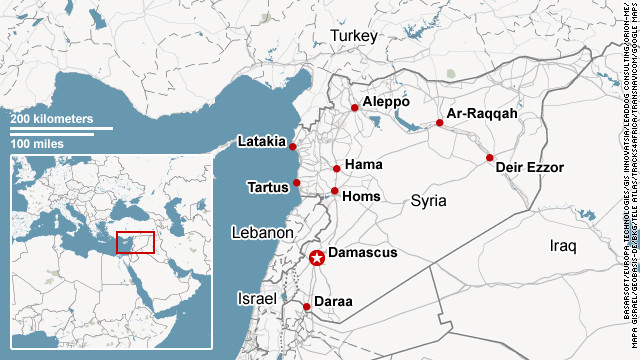- MIDDLE EAST NEWS
- FEBRUARY 6, 2012, 2:52 P.M. ET
The U.S. closed its embassy in Damascus on Monday, citing rising violence, a day before Moscow was due to dispatch high-level envoys to Syria for talks with one of the Kremlin's last allies in the region, besieged President Bashar al-Assad.
The Obama administration shut the U.S. embassy in Syria Monday due to rising violence in the country that U.S. officials said placed American diplomats in Damascus at increasing risk. Jerry Seib has details on Lunch Break.
WSJ's Charles Levinson reports pressure is mounting to force Syrian President Bashar al-Assad from office. U.S. Secretary of State Hillary Clinton is calling on an international coalition to help drive al-Assad fron office. AP Photo
But with the Syrian army renewing assaults on rebel positions on Monday, there seemed to be little chance that the Russian officials would be able to avert a deepening of the conflict, which the United Nations said had killed 5,400 even before bloodshed reached new levels in recent weeks.
Western leaders stepped up their criticism of the Kremlin, which was joined by China over the weekend in vetoing a draft resolution at the U.N. Security Council that would have called on Mr. Assad to step aside.
At a summit on Monday, French President Nicolas Sarkozy called the failure of the resolution a "scandal." His German colleague, Angela Merkel, denounced the result as "appalling" and warned Russia that it risks being on the wrong side in "a historic situation."
Mr. Sarkozy said he planned to speak by phone later Monday with Russian President Dmitry Medvedev on the issue, but a Kremlin spokeswoman said no call was scheduled.
The European condemnation came one day U.S. Secretary of State Hillary Clinton called the Russia-China veto a "travesty" and said Washington and its allies would seek to work outside the Security Council to ensure political change in Syria. She said the U.S., Europe and some Arab states would establish a "Friends of Syria" network to strengthen Syria's political opposition and increase the Assad regime's diplomatic and economic isolation.
Associated Press
A member of the Free Syrian Army stands guard as anti-Syrian regime protesters hold a demonstration Monday in Idlib province, which borders Turkey.
Mrs. Clinton stressed that this alliance wasn't considering undertaking military action inside Syria.
Moscow denounced the international barbs aimed in its direction. Foreign Minister Sergei Lavrov dismissed them as "on the edge of hysteria," telling Russian news agencies in Moscow that a compromise might have been possible had the Security Council held off on its vote until after the Russian mission to Damascus on Tuesday. "But for somebody, it was more important to have someone else to blame for what's happening," he said.
China rejected accusations that its veto was obstructionist, saying it was forced into staking out that position after some Security Council members pressed for a vote before disagreements had been resolved.
"China does not have selfish desires in the Syria issue," said Foreign Ministry spokesman Liu Weimin during a daily press briefing Monday. "As a responsible large country, China will join together with the international community to continue playing an active and constructive role on the Syria issue."
Mr. Liu didn't offer specifics on how China proposes to end the violence in Syria in the absence of a U.N. resolution.
The Security Council vote was held Saturday, following reports that a Syrian attack in the city of Homs had killed more than 200 people, in one of the conflict's deadliest episodes yet.
On Monday, Syrian forces continued a heavy assault on Homs for the third straight day, with tanks surrounding restive neighborhoods and pounding them with artillery, rockets, mortars and tank shells throughout the day, according to residents reached by phone.
The Syrian Observatory for Human Rights, a U.K.-based opposition group that tabulates casualty reports from across Syria, said at least 23 people had been killed as of early afternoon Monday, and expected that number to rise. At least 10 people were killed in clashes elsewhere in the country, the group said.
Regional Upheaval Track events day by day in the region.
The Syrian state news agency denied responsibility for the deaths, blaming violence on rebel gunmen.
A resident of the city's Inshaat neighborhood said by telephone that helicopter gunships were deployed for the first time Monday in Homs, firing rockets into residential areas. The claim couldn't be verified, but if true would mark a significant and largely expected escalation by President Assad in the wake of the U.N. veto.
"The regime hasn't used artillery and tanks much, and it hasn't used aviation at all, until recently," said a Damascus-based political analyst. "Now its beginning to use heavier weapons to punish whole neighborhoods collectively. This is something new and what happened at the U.N. is providing cover for that."
Mr. Lavrov declined to detail Monday what message he and spy chief Mikhail Fradkov will carry to Damascus on Tuesday, saying only that Moscow will renew its calls for Mr. Assad to "accelerate the reforms that have been announced."
Read More Opposition leaders and analysts say the political changes that Mr. Assad has offered, though they would have seemed radical before the start of the 11-month insurgency, are now hardly likely to be enough to satisfy opponents. U.S. and European leaders, as well as many in the Arab world, have intensified calls for Mr. Assad to step down.
After watching as a number of key clients and allies in the Middle East have fallen victim to revolutions in the Arab Spring, Moscow is reluctant to abandon Mr. Assad, one of its closest and most important partners in the region, diplomats and analysts said. And with Prime Minister Vladimir Putin facing unexpectedly strong opposition at home to his bid to return to the presidency in next month's election, the Kremlin also is looking for ways to demonstrate its toughness on the international stage, these people said.
At the same time, the Kremlin wants to avoid being too closely associated with Mr. Assad if his regime is in its death throes.
Last week, Mr. Lavrov for the first time seemed to distance Moscow from the Assad regime, saying the Kremlin was seeking to defend the principle of non-intervention, not Mr. Assad personally.
But it isn't clear whether Moscow has yet concluded that Mr. Assad is a political goner. In an article in the official Rossiiskaya Gazeta newspaper Monday, Yevgeny Primakov, a former prime minister and Middle East expert who often advises the Kremlin informally on foreign policy issues, wrote that "a significant, if not a majority share of the population is on the side of the Bashar Assad leadership."
The article accused the U.S. of taking advantage of the Arab Spring to "remove undesired Arab regimes" and said ousting the Assad government would lead to "chaos" in the region.
Mr. Assad has been one of Russia's most important weapons customers and Syria is home to a naval facility that is the Kremlin's only major military outpost outside the former Soviet Union.
"We really need to hold onto Syria," Sergei Chemezov, a top arms-industry official and close Putin ally, told the Interfax news agency in late January. "It's a litmus test for all the Arab countries that are still working with us. They're watching us."
Last week, Russian officials said the sanctions against the Moammar Gadhafi government in Libya had cost Moscow $4 billion in arms sales.
Georgy Mirsky, an analyst at the state-run IMEMO think tank in Moscow, said the Kremlin had "miscalculated" in vetoing the resolution Saturday, which already reflected major concessions to Moscow's demands.
"We should have voted for it and declared it a victory for our diplomacy," Mr. Mirsky said, noting that the Kremlin seems focused on "creating the impression among our population that we don't give up our own" ahead of the elections. Kremlin officials deny any domestic-political motivation.
China's veto stands in stark contrast to Beijing's decision last March not to veto a resolution against Libya, which paved the way for the toppling of Moammar Gadhafi's regime.
China's economic interests in Syria are much smaller than in Libya, where it appears to have made a decision to get out of the way of the Security Council vote not to antagonize Libya's likely new leaders and jeopardize Chinese investments there.
Trade between China and Syria was $2.5 billion in 2010, while trade between Libya and China was $6.6 billion, according to Chinese customs data.
China's veto of the Syria resolution on largely ideological grounds suggests growing concern for Beijing over widening resistance toward authoritarian regimes across the Arab world. China was spooked last year by online calls for a "Jasmine Revolution," and has embarked on its most severe crackdown on political dissent in more than decade as a result.
In a commentary Monday, the Communist Party's flagship People's Daily argued the U.N. resolution was illegal. Commentaries in the paper are often a reflection of high-level government thinking, though they are not always an endorsement of policy.
"The United Nations can stop aggression, but it cannot force a country to replace its regime," the commentary read. "As long as there is a 1% hope for peace, we must pay it a 100% effort."
Shortly after the U.S. announcement that it was pulling its ambassador from Damascus, the U.K. Foreign Secretary William Hague said the British ambassador to Syria will be recalled for consultations. "This is a doomed regime as well as a murdering regime," he said. "There is no way it can recover its credibility internationally."
The U.S. ambassador, Robert Ford, will perform his duties from Washington but will focus on working with Syria's political opposition to ensure an eventual political transition inside the Arab country, the State Department said.
"The recent surge in violence, including bombings in Damascus on Dec. 23 and Jan. 6, has raised serious concerns that our embassy is not sufficiently protected from armed attack," the State Department said in a statement Monday.
The State Department said Mr. Ford will work particularly as an interlocutor with President Assad's political opponents."Ambassador Ford will maintain contacts with the Syrian opposition and continue our efforts to support the peaceful political transition which the Syrian people have so bravely sought," the statement added.
The State Department said Ambassador Ford and all remaining American officials safely departed Syria over the weekend.
The career U.S. diplomat had been attacked on at least two occasions by Syrian mobs loyal to President Assad in recent months. The ambassador had also faced a number of death threats, U.S. officials said.
Source:The Wall Street Journal


 RSS Feed
RSS Feed
